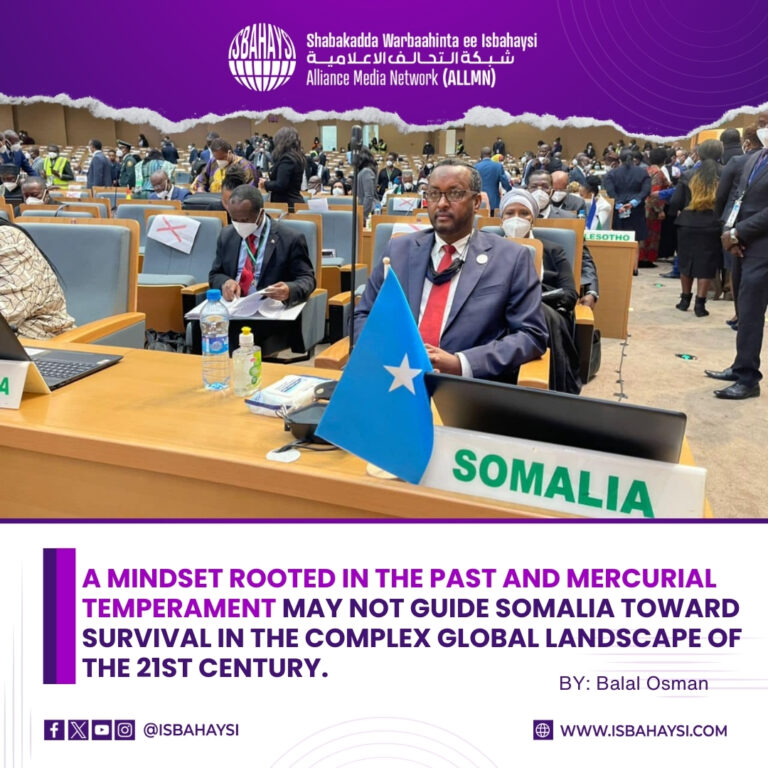
It is undisputed that the Somali people have a rich history, resilient culture, and deep tradition that have passed tests through centuries. But as it progresses further into the 21st century, marked by fast globalization, technological advancements, shifting geopolitical powers, growing economic inequality, to mention a few, the burning question is, how can today’s Somalis, with their current mindset and sometimes mercurial conduct towards governance, take the country where it needs to be in this increasingly complex world?
Indeed, the intention here is not to question Somali people’s resilience and adaptability, in the contrary, Somali people have over centuries survived the rise and the falls of empires, the challenges imposed by various colonial powers and continues political uncertainties. Somali’s resilience and adaptability are partly rooted in its heritage from the times of the Cushitic Empire, as well as its subsequent connections with ancient civilizations across the Indian Ocean and the Red Sea including China, Persia, the Arabian Peninsula and India, among others.
These connections through trade, culture and diplomacy coupled with its heritage have shaped Somali’s enduring strength. This endurance and early-on global exposure have been central to the survival of the Somali people over the centuries, nevertheless, adapting to the unfolding 21st century’s sophisticated demands call for a fundamental change in the current mindset of Somalis and different strategic engagement tactics. Reliance on the traditional way of thinking is evidently no longer be sufficient in a world driven by technological proficiency and frequently changing partnerships.
Yes, Clan-Structured governing systems, oral traditions and a strong pastoralist/agriculturalist culture inherited from the forefathers have historically served as the backbone of Somali life, offering a survival and way of life deeply ingrained in Somali identity.
However, today’s interconnected economic, political, social and educational landscapes prioritise systems and infrastructure mainly grounded in technological advancement and strategic partnership, therefore, for Somalia to thrive in this new context, traditional practices need – of course to be preserved – but to be strongly supplemented with skills and systems that align with global necessities, particularly, strong nation vison with effective governance strategies, high quality education, robust economic development and most importantly, mutually beneficial and strategic partnership.
A forward-looking educational system that embraces both the preservation of cultural heritage and the promotion of innovation, as well as, effective governance strategies will enable the nation to form effective regional and global partnerships and can address complex and interconnected issues in an increasingly interdependent world. Advancing an education system that brings modernization in line with current world demands does not mean abandoning traditional and cultural values, instead, it is about equipping Somali youth with the tools necessary and empowering the next generation of Somali leaders and experts, to contribute meaningfully in a sophisticated global environment while maintaining their cultural values.
For instance, the Somali traditional clan-based system survived through centuries as governance system, though filled with short-comes, however the globalized world of the 21st century calls for a more purposeful governance system and building coherent institutions that can navigate complex international relationships, necessitating the need to look beyond local structures and seek inspiration from successful models of modernization elsewhere in the world that can be adapted to Somali society to remain competitive and to have a secure future in a globalized arena.
In the 21st century where AI and quantum computing, among other technological advancements, drives data-security, national defences, commerce and information, inter alia, Somalia cannot afford to be left behind and rely solely on the traditional structures and mindset. Although Somali people have recently taken few initiatives that shows relatively promising future such as mobile banking and telecommunications, as showed by the effective rise of mobile money solutions like EVC Plus and E-Dahab in the country, the next step should be to profoundly foster an environment that encourages good governance, geopolitical prudence and technological advancement in that order.
Additionally, subject to embracing good governance in the country, developing infrastructure and establishing a stable business climate that can attract investment and create opportunities for Somali youth to contribute to their economy is equally important. Similarly, as Somalia navigates its place in a rapidly evolving global landscape in 21st century, it is also equally crucial for the country to prepare for the complexities of a world-order that appears to be shifting towards a new era of Cold War mentality.
The resurgence of geopolitical tensions fuelled by the competition and wars between major powers necessitates a careful recalibration of Somali’s global partnerships and strategic positioning. As today’s world demands more than survival, being a Somali Politian in the 21st century must mean eloquence in the global geopolitical discourses in order to be able to build partnerships that benefit the country’s national interest instead of looking for trivial personal/clan/group interests.
This is about embracing dual characteristics – maintaining Somalia’s national interest while engaging with and contributing to the broader regional and global society with strategic and thoughtful adaptation and partnerships. Somalia’s survival in this complicated world mainly depends on a shift from the current governance mindset to an approach that integrates Somali traditional governance structure with the modern governance structures and knowledge necessary for regional and global engagement. When Somalia embraces this dual path—honouring its traditional governance structure while expanding its reach into a world that requires constant adaptation and growth – they can secure a future where it doesn’t not only survive, but thrive in a sophisticated world. By balancing tradition with modernization, Somalia has the potential to create a place of strength, influence, and resilience in an increasingly complex world.
_____________________________________________________________________________________
Author: Mr. Balal Mohamed Cusman, Former State Minister for Foreign Affairs and International Development of Somalia. Email: [email protected]. X: @BalalCusman